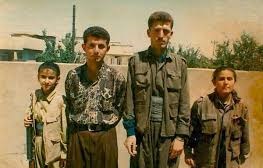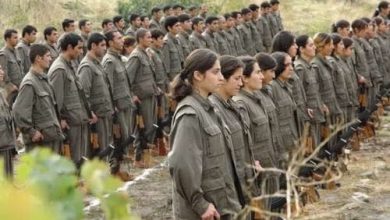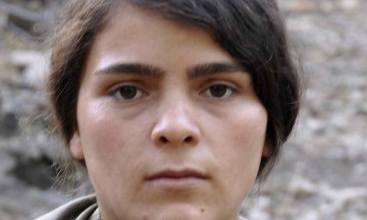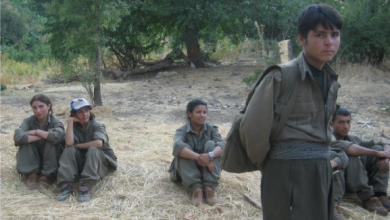Dana Pashabadi has, for the first time, shared his account of joining and subsequently escaping KOMALA on two separate occasions with a reporter from the Iranian Kurdistan Human Rights Watch
In today’s complex and challenging world, stories of individuals whose lives are impacted by social and political circumstances are deeply compelling. One such story is that of Dana Pashabadi, who joined the Komala group for the second time and faced numerous challenges along the way. This individual, during his initial period of membership on May 18, 2022, illegally joined the group via the Nowsud border in Kermanshah along with a friend, Karo Mardukhian. After 27 days in the group’s camp, he re-entered the country illegally.
However, this story is not solely about joining a group. In early winter of 2022, Dana met Hasti Fatahi, daughter of Fariborz and a resident of Ravansar, and after some time, they decided to marry. This decision was met with opposition from Hasti’s father. Following this opposition, they were forced to leave home and disappeared for a while. Lack of financial resources and fear of the consequences resulting from Hasti’s father’s behavior led them towards the Komala group, highlighting the numerous social and familial challenges that many young people face today. This story is not just a tale of forbidden love but also a symbol of familial and social pressures in the contemporary world.
Dana Pashabadi, born on December 19, 2004, in Kamyaran, son of Ali Akbar, has for the first time shared his account of joining and escaping Komala on two separate occasions with a reporter from the Iranian Kurdistan Human Rights Watch.
Question: Could you tell us a bit about yourself? Where were you born, what path did you take that eventually led you to join the Komala group? How much did you know about the group’s armed nature and its beliefs and ideology?
Dana Pashabadi: I was born on December 19, 2004, and grew up in an ordinary family. My father was a hardworking man who always tried to manage our lives with very little. But our living conditions were such that I could never envision a bright future for myself. I left school early and took on seasonal and low-paying jobs. I had no hope for advancement and no social support. In such an environment, feelings of emptiness and rejection took root in me. The talk of friends and acquaintances about “escaping Iran” and “freedom across the border” appealed to me. One of my old friends, Karo Mardukhian, always spoke of Komala’s ideals and struggle. I didn’t have detailed information, but I was swayed by his emotional fervor and glamorous talk. He said that the Komala-Alizadeh group was looking for young recruits and that we could both achieve our goals and earn money, maybe even get asylum later. In reality, I was deceived and joined an armed group for a better life and more income.
Question: When did you decide to leave the country? How did it happen? And what did you feel when you left Iran?
Dana Pashabadi: It was exactly on May 18, 2022, in the middle of the night, that we left the country illegally through the Nowsud border in Kermanshah, along with a group of border couriers. Those moments were a mix of fear, excitement, and uncertainty for me. Every step we took in the darkness was fraught with the risk of arrest or being shot. But in my mind, there was only the image of a different life that had been promised to me. When we reached Iraqi Kurdistan, forces affiliated with the Komala group took us in. After an initial check, we were transferred to a camp in the highlands. The camp was cold, and basic amenities were almost non-existent. From the very first night, I realized that the atmosphere there bore no resemblance to what I had been promised. We didn’t even have the possibility of a normal life!
Question: What happened in the Komala camp? What was your experience like?
Dana Pashabadi: The first day was just registration and handing over belongings, but from the second day onwards, we entered intense training programs: cleaning, military drills, and ideological sessions. Everything was scheduled; we even had to ask permission to go to the bathroom. They told us that Komala’s struggles were a continuation of the revolutionary ideals of the years before the revolution. But what I saw was only violence and mistreatment of new recruits. I was looking for a new hope. I had been told that this group sought freedom and justice, and as a young idealist, I was influenced by these ideas. I felt that this was a place where I could find my voice and join a great cause. But as soon as I arrived, I realized that the reality was very different. Living conditions in the camp were very harsh, and I faced inhumane treatment and severe control. Food was scarce, clothing was inadequate, and the sleeping quarters were shared and unhygienic. Everything there was like a strict military barracks. After two weeks, Karo Mardukhian was also tired of the situation, but we didn’t dare to protest. In the camp, we were completely monitored and had no freedom of action. The days were filled with mandatory ideological sessions that were imposed on us. All our time was spent listening to speeches and participating in forced discussions. If anyone asked a question or objected, they were severely punished. In fact, their goal was to control our minds and souls. We had no opportunity for independent thought and were under intense pressure. As a result, we decided to escape. On the twenty-seventh night, during a brief lapse in security, we left the camp. The journey back was harder than going, but I finally managed to return to Iran.
Question: What did you do after returning? How did you end up going down the wrong path again?
Dana Pashabadi: After returning, I tried to build a normal life, but the economic pressure, the way people looked at me, and the feeling of failure crushed me from within. In the autumn of 2022, I met a girl named Hasti Fatahi. She was a kind and understanding girl, and our relationship deepened very quickly. We decided to get married, but when we raised the issue with Hasti’s father, he strongly opposed it. Her father was a traditional and strict man. To put pressure on him, Hasti decided to run away from home, and I, who was not in a good mental state, went with her. But since we had no money and nowhere to go, we decided to flee Iran again, and this time we headed towards the Komala-Mohtadi group.
Question: How did your second experience in the Komala-Mohtadi camp differ from the first?
Dana Pashabadi: This time the situation was much worse. They knew about my previous involvement and therefore treated me with suspicion and violence. Hasti was also under severe pressure; they humiliated, insulted, and even accused her of spying. They didn’t allow us to talk to each other. Mandatory ideological sessions continued from morning till night, even on Fridays. Hasti became severely depressed and threatened to commit suicide several times. We requested to leave, but they said, “Leaving the group is betrayal, and the punishment is severe.” During this time, I clearly understood that these groups not only have no human ideals but are tools of suppression, abuse, and psychological control of people.
Question: How did you manage to escape for the second time?
Dana Pashabadi: With the help of a local smuggler we had become acquainted with, we finally found a way to get out of the camp. The second escape was much riskier. We had to hide in the mountains for three days so that the group’s forces wouldn’t追捕 us. When we reached Iranian soil, I decided to surrender myself. I was exhausted and wanted to either live or have it all end.
Question: How did the Iranian forces treat you? Did you encounter the fears that the group had told you about?
Dana Pashabadi: No, on the contrary. From the very beginning, I was treated with respect and humanity. There were no threats, and everything was handled legally and meticulously. I provided full explanations and spoke of my decision to return. After investigations and consultations, I was given the opportunity to reintegrate into society.
Question: Where is Dana Pashabadi in his life today?
Dana Pashabadi: Today, I am a simple laborer, but I am free. I am no longer dependent on any ideology or involved in power games. I just want to live right, help my family, and make up for my past. I am still grappling with the psychological consequences of those days, but I am trying. My only plea to other young people is not to trust the colorful words and promises of groups like Komala. Nothing awaits you on the other side of the border except misery, humiliation, and being used as a tool.






